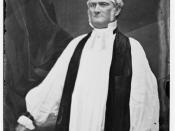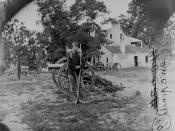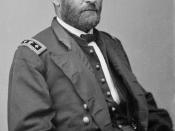General Ulysses S. Grant was of the Union Army in the Civil War. He had a policy knows as the 'total war' policy. He believed that when you have an enemy, you aren't only fighting against its army, but you are fighting against its society. He thought that killing the enemy's army isn't enough in a war. One should destroy all buildings and shops and plantations (for the Southern states). He wanted to destroy all the means by which the enemy could make war. This included factories making weapons and clothes, shops and plantations where required provisions such as food can be found. In other words, he wanted to destroy the enemy's economy. He basically wanted to destroy the morale of the enemy to fight. And he didn't care how many soldiers it took to destroy the enemy. All he wanted was to win, regardless of how many soldiers or people died.
And this war policy of his was used in the Civil War under his command by the Union War. In one of the battles of the Civil War, the Battle of Shiloh, 13000 Union and 11000 Confederate soldiers perished on the battlefield.
This war policy had a disastrous effect on the South. Cities in the South were in ruins. Everything that had a military or economic value was destroyed. This included railroad tracks, crops, businesses, and homes. The most badly destroyed cities were Georgia and Richmond. Structures of wood were burnt, and buildings of stone and brick were 'cannon balled.' The south's economy was completely ruined. And since many of the men in the South died in combat, it became more difficult for the South to handle the reconstruction of the cities. Now the future of the South depended on the Union (the Northern States),



Okay essay
The sentences need to be more structured. I found a lot of words in there that need to be changed, because it doesn't make sense. Some typo erroes also.
2 out of 3 people found this comment useful.